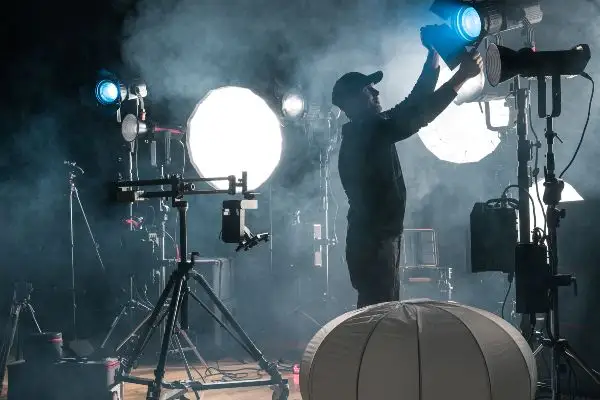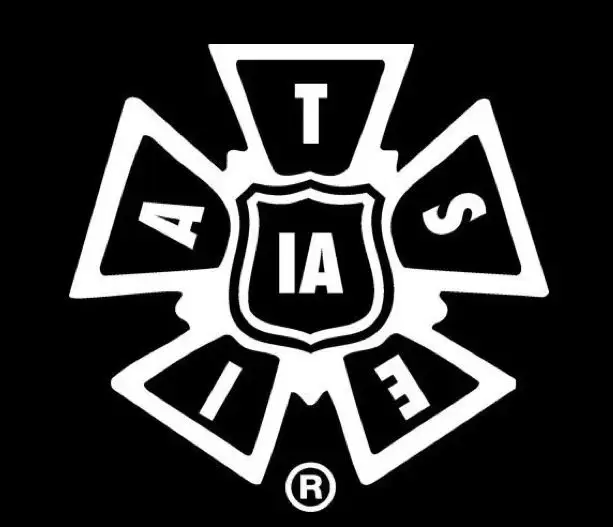Behind every concert, theater performance, or arena show is a crew of professionals working tirelessly to make it all happen. These are stagehands . And while they may not get the spotlight like the talent, they are the ones rigging the lights, running the cables, loading the gear, and making sure every technical detail runs smoothly.
Their work is often invisible to the audience, but without them, the show simply doesn’t go on. And if you're interested in how to become a stagehand, we're here to help.
In this guide, we’ll break down exactly what a stagehand does, the skills you'll need to get hired for stagehand jobs, how to get started, which certifications to consider, and what the path looks like if you want to turn backstage hustle into a lifelong career.
What Does a Stagehand Do?
Stagehands are responsible for many of the technical elements of a live show. From unloading trucks to managing lighting, sound, rigging, video, and scenery, they make sure everything works behind the scenes so performers can shine out front.
Some of the typical tasks include loading in gear, setting up risers, running cables, assembling trusses, and rigging lights and audio equipment. During shows, they might operate follow spots, assist with cue calls, troubleshoot technical issues, or stand by to swap props or reset stage equipment.

Once the event ends, they strike the set and load everything back into the truck, often late at night or early next morning.
Stagehands work closely with stage managers, production crews, sound and lighting designers, and performers. Communication and timing are important, especially when working live under pressure.
You’ll find stagehands working in all kinds of environments, including theaters, concert venues, convention centers, festivals, and on national or international tours.
Most of the time, you’re part of a larger team. You won’t always be the one calling the shots as part of a production company, but you’ll be the one making sure things actually get done. Being able to follow directions, adapt quickly, and perform physically demanding tasks is a must.
Essential Skills & Traits
While having the physical strength to lift heavy equipment is an important part of most stagehand jobs, it's not the only one. You also need to master a wide range of technical and professional skills that keep live productions running smoothly.
At the core is technical know-how . You’ll need a working knowledge of rigging systems, electrical gear, power tools, lighting boards, and sound consoles. Hands-on experience often counts more than theory here. Stagehands are expected to troubleshoot and operate gear efficiently, often in low-light or time-sensitive conditions.
Another non-negotiable skill is safety awareness . You’re lifting heavy objects, working with electricity, and climbing ladders or scaffolding. Staying alert and following safety protocols will protect you and your team.
Of course, you can't go without talking about how physically demanding a job it can be. Expect long hours on your feet, repeated lifting, bending, and hauling gear across stages or arenas. It will no doubt test your physical strength and stamina in ways you couldn't imagine, so staying in shape is key.
Keeping your mind sharp and in shape is equally important. You'll need to have good communication and coordination to keep up with a fast-paced crew. In the live business, timing is everything. You need to follow instructions precisely, respond to changes on the fly, and work well with others without getting angry or flustered.
And because this is a job where you'll likely hop from one show to the next throughout your career, you'll want to make a good impression on the people who hire you, so that they'll want to rehire you. Be early. Be respectful. Don’t bring ego.
The Typical Entry Routes for Stagehands
You don’t need a formal degree to become a stagehand, but having a technical background helps. Many professionals study technical theater, music technology, audio engineering, touring production, or even general electrician programs. This level of knowledge will give you a leg up when dealing with lighting rigs, power loads, and signal flow.
Apprenticeships or union routes are common for hands-on experience. IATSE (International Alliance of Theatrical Stage Employees) offers structured training and the chance to work on real shows under experienced crew chiefs.
Some programs are tied to ETCP certification (Entertainment Technician Certification Program), which offers credentials in rigging, arena rigging, and entertainment electrics. If you want to work at height or handle high-voltage gear, this is how you show you're qualified.
If you're a student or just starting out, volunteer at school plays, community productions, or local clubs. These are great low-pressure ways to build muscle memory and learn by doing.
You can also look for short-term gigs through temp and event staffing firms . These companies staff concerts, trade shows, and corporate events and are always looking for capable hands who can lift, listen, and learn.
Union Membership
In North America, IATSE (International Alliance of Theatrical Stage Employees) is the major union for stagehands. Joining a local chapter opens doors to better-paying, more consistent gigs in film, theater, broadcast, and large-scale touring. Union members also benefit from collective bargaining , legal protections , and access to ongoing training . In many cities, high-end productions only hire through IATSE.

Outside the U.S., other organizations fill a similar role. The Association of British Theatre Technicians (ABTT) in the UK and various regional trade groups in Europe and Australia offer training, networking, and support for backstage workers.
Beyond the fact that union jobs pay better, being part of the union also signals competence, commitment, and reliability in the entertainment industry.
Is Being a Stagehand Right for You?
Before diving in, it’s worth asking, "Does the lifestyle fit?" Like most jobs in creative industries, being a stagehand isn’t a 9-to-5. It’s often more like a 4 p.m. to 2 a.m., with heavy lifting, late nights, and load-outs that test your knees and patience. You might climb ladders, crawl under risers, or wrangle gear in the rain. Weekends off? Not likely. And touring crews can be on the road for weeks at a time.
But for many, the payoff is real. You get to be part of something electric, both literally and emotionally. There’s a thrill to watching a show come alive, knowing your hands helped build it. The crew becomes your second family, sharing backstage banter and road stories. Travel is often baked into the job, especially for concert and corporate event crews.
Corporate events can also build steady income while you keep concerts on the side. The pay is solid, and you get both structure and fun if you balance it right.
If you thrive under pressure, enjoy technical puzzles, and don’t mind getting dirty for a standing ovation you’ll never see, stagehand life might be a perfect backstage pass.
Final Thoughts - Gain Experience and Find Stagehand Work
Stagehands are the backbone of the live entertainment industry. The best ones understand the technical aspects of live music and theater productions, know how to communicate effectively, and have on-the-spot problem-solving skills when things go awry with sound systems, stage lighting, or crew members.
Without them, shows wouldn't happen. If you're looking for stagehand jobs and you're just starting out, start by volunteering at a local theater or jump into union apprenticeships. This is a craft you learn by doing.
Start small. Show up early. Stay sharp. Get certified when the time’s right. From club gigs to arena tours, there’s a real path here.





